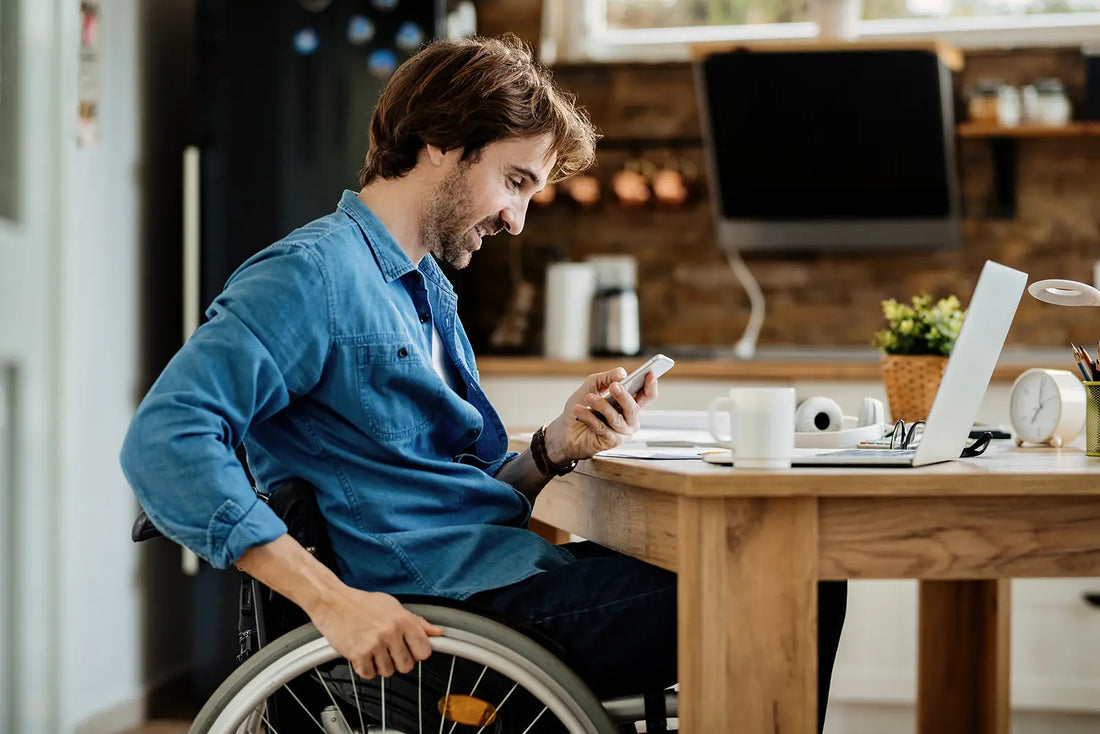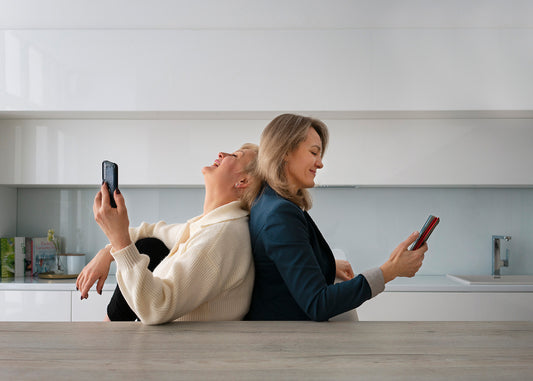
How voice commands and remote control can help people with disabilities
Share
A few days ago, we talked about how smart homes can be adapted to the needs of elderly users, so as to significantly improve their well-being and quality of life. Indeed, one of the most remarkable features of the new generation of ‘smart homes’ is their incredible flexibility: never before have homes been able to mould themselves to the habits, desires and needs of their inhabitants.
This principle, of course, applies to all types of users, including those with specific needs - such as people with disabilities, for whom the technological innovations provided by the smart home can have truly transformative potential, making everyday life simpler, more comfortable and even more fun.
Let's take voice commands and remote control as an example: devices such as Amazon Alexa, Google Home or Apple HomeKit allow users to manage various appliances and functions (such as turning lights on or off, changing the indoor temperature, starting a playlist, and much more) by simply... talking! Remote control, on the other hand, allows you to manage devices and functions wherever you are and whenever you want, simply by accessing specific applications - such as our Freedompro Home app -via smartphone or tablet and tapping on the screen.
These innovations are becoming increasingly common in our homes and, in some cases, are now almost taken for granted. However, in many cases they can actually simplify tasks that would otherwise require a lot of effort or even the presence of another person to perform.
Smart home = greater personal freedom and independence
People with motor or sensory disabilities can benefit enormously from a smart home because, through automations and voice commands, many complex or even impossible everyday actions are greatly simplified.
Let's look at some practical examples.
- Smart home appliances: in a smart home, it is possible to automate tasks such as turning on the oven or starting a washing machine with a simple smartphone, limiting travel within the home to a minimum. What's more, thanks to advanced solutions such as the Smart Outlet Modules, part of Freedompro's Smart Modules range , even non-iT devices (such as the coffee machine, hair straightener, electric stove and many others) become smart and can be managed easily, directly from the smartphone, thanks to the direct automation of the sockets to which they are connected. You can find out more by reading our previous article!
- Increased security: even security systems can now be controlled remotely and extremely intuitively. This means that you can turn them on and off with a touch (or a word) and monitor your home even when you are physically somewhere else. Likewise, we can receive real-time notifications in case of emergencies or suspicious movements. What's more, smart devices such as smart smoke or carbon monoxide detectors can detect anomalies within the home and report them immediately. Not enough? Even taking medication is now more precise and punctual thanks to voice assistant reminders, while various smart wearable devices can monitor vital parameters and alert family members or caregivers in case of need.
- AImproved accessibility: voice control and smart technology in general are not only available today for many household appliances, but also for doors, security doors and locking systems such as locks. It is easy to imagine how such technology can help a disabled user to move more comfortably within their most private spaces! In this sense, Freedompro proposes - as part of its Smart Modules range - the new Dry Contact Modules, which allow the automation of impulse or dry contact devices (i.e. responding to simple on and off impulses) such as the pedestrian entrance, the driveway gate and the electric garage door. You can learn more about them by reading this in-depth.
- Improved quality of daily life: smart home technology today offers an incredible degree of comfort and convenience, as it allows the automation of activities that were once manual, such as adjusting the temperature, turning lights on and off, raising or lowering shutters, and so on. In this sense, we suggest you take a look at the Smart Light and Smart Shutter Modules from Freedompro's Smart Modules range, designed to meet precisely these needs: perfect for improving circadian sleep/wake rhythms and increasing the comfort of your spaces!
- More socialising: voice assistants associated with smart speakers, smartphones and tablets finally facilitate relationships with others and communication because, through video calls and voice messages, they allow people to stay in touch with family and friends even when they cannot leave their homes. The automation of routines and the remote management of social engagements also help reduce the stress associated with mobility, making it easier to participate in online events or activities. Not to mention that, of course, this technology also facilitates access to social media and interactive entertainment platforms!
Beware though: too much automation can isolate
Notwithstanding the extraordinary advantages that a smart home and its automations can bring to the daily life of all types of users, including those with disabilities, one must always consider the possible downside.
Excessive automation, if not managed well, can for example create a sort of ‘bubble ’ around the person: if all daily interactions are mediated by machines or voice assistants, there is a risk of further reducing human contact, experiencing an unpleasant feeling of isolation or over-dependence on technology.
To avoid this, it is important to carefully assess individual needs: each person has different needs, and a solution that is effective for one may not be so for another. The individual's health condition, age, abilities and preferences should therefore always be taken into account when choosing the most suitable devices.
Furthermore, consulting experts in the field can help not only to find the most effective solutions, but also to be sure that the chosen system meets the appropriate criteria of security, usability and reliability.
Another crucial aspect is compatibility between devices. Ensuring that the devices chosen work well with each other and with the voice control or smartphone platforms used will ensure a smooth and seamless user experience, as choosing compatible systems reduces the risk of malfunctions and improves the overall integration of the smart home.
In parallel, it is essential to consider the usability and accessibility of the interfaces: for those with motor or visual impairments, devices with intuitive and customisable interfaces can really make a difference! The aim here is to find simple and practical solutions that improve the quality of life without creating technological barriers: in this regard, did you know that Freedompro's entire Smart Modules range is Matter certified? Find out here why it is extraordinarily advantageous!
Finally, planning installation and maintenance is essential. Relying on qualified personnel for installation ensures that the system is configured correctly and functions smoothly, avoiding malfunctions or unexpected problems.
Ultimately, both voice commands and remote control represent a major breakthrough for the autonomy of people with disabilities. They offer freedom, security and greater independence, transforming the home into a more accessible, welcoming and ‘people-friendly’ environment. However, it is important to balance their use with maintaining human interactions and making sure that there are ‘plan Bs’ to put in place in case of technological malfunctions.
After all, what would a smart home be if it was not used intelligently


